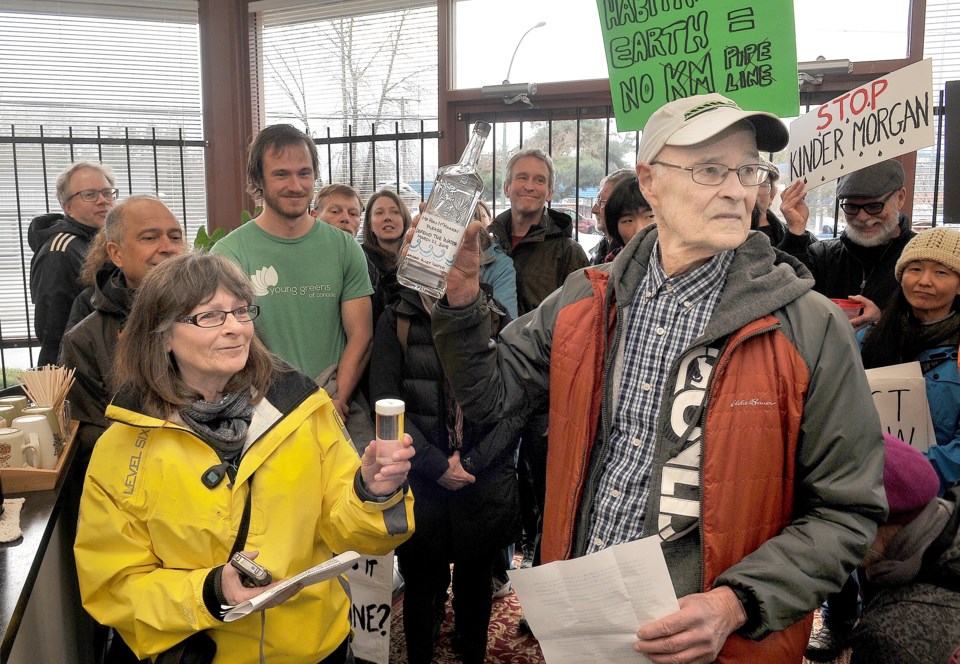The Editor,
Re. “No to city’s pipe plea” (The Tri-City News, April 16).
History shows that British Columbia’s provincial politics are dominated by ideological polarization and a tendency to extremes, with no middle ground ceded in what amounts to a zero-sum game where there is a winner-take-all attitude. This was most clear in
Gordon Campbell’s landslide victory in 2001, when the BC Liberals won all but two seats in the legislature, reducing the NDP to unofficial opposition status. More recently, it took a Supreme Court of Canada decision to force former BC Liberal premier Christy Clark to relent in her obsessions and restore class size and composition elements to B.C. teachers’ contracts, a move that took some 13 years or so to come to conclusion.
Today’s NDP, likewise, is plagued by its own drive for ideological and environmental promises of purity: No to Site C dam, Yes to Site C dam; No to liquefied natural gas, Yes to LNG; No to bridge tolls, maybe Yes to smaller tolls.
But the line in the sand Premier John Horgan will not cross “as long as he is premier” is the twinning of the existing Kinder Morgan Trans Mountain pipeline, which has been in operation since 1953, and its possible implications for the health of the B.C. coastline should a bitumen spill occur, given an increase of one tanker a day in traffic. Needless to say, three Green Party members (who are propping up the razor-thin NDP minority government) are also dead set against this.
Normally, minority governments can be creative ventures and a boon for democracy, which is about making compromises in a complicated world. But Premier Horgan’s posturing appears to pander to a form of environmental populism that resonates widely in a province as blessed as British Columbia. I see no NDP effort to compromise with Andrew Wilkinson’s BC Liberals on the other side of the legislature regarding this issue nor any efforts to work with their NDP cousins in Alberta under Premier Rachel Notley, nor with the federal Liberals under Justin Trudeau.
Can they all be wrong? Can the BC NDP be all right? Should a so-called “constitutional crisis” tilt on a three-member Green alliance with the NDP in British Columbia?
I tend to disagree, but, maybe in another light, this letter to the editor could be considered about 50% correct.
Joerge Dyrkton, Anmore
TOO MANY THREATS
The Editor,
A few pieces of information about the proposed Trans Mountain pipeline twinning:
The people who oppose this project — teachers, professors, geologists, engineers, students, steel workers, tar sands workers and those in many other occupations — are aware of the risks and dangers.
The tank farm on Burnaby Mountain and the pipeline are old and rusting and about 15 years past their best-before date. Originally, this pipeline carried crude oil for five local refineries, but no more. The product going through this pipeline is not for Canadian use.
There is a cocktail of carcinogenic, neurotoxic, corrosive and highly explosive chemicals added to tar sands oil in order for it to flow through a pipe. In 2007, a pipeline was ruptured in Burnaby and many people in that area are still suffering the effects of the chemicals that rained down on their houses and property.
The firefighters association has said that should the tank farm catch fire, fire crews would never be able to contain it and the fire would burn out of control for a very long time, spreading noxious gases as far as Chilliwack and beyond. There are 13 existing elderly tanks and several more slated to be installed and only one exit down the mountain from SFU.
B.C. is entitled to 2% of the revenue. Approximately 50 permanent jobs or fewer will result from this pipeline, and the second pipe that is being built is of a larger diameter and a thinner grade of steel. Should a fire happen at the tank farm, Kinder Morgan is only required to pay up to $1 million for clean-up — B.C. taxpayers would be on the hook for the rest. Municipalities incur large costs working around these pipelines in their communities.
So far, Canadian taxpayers have paid about $43 billion to oil companies for them to operate in Canada. That money could have gone to research and development of green energy. This year alone, there have been five oil tanker fires, creating havoc around the world. With the twinning of the KM pipeline, the tanker traffic through Burrard Inlet would increase from approximately 80 tankers per year to more than 400 per year. Pleasure crafts, canoes, kayaks and the like, will not be safe, nor will humpbacks, orcas and other marine life.
With the very real threat of a tank farm fire, a huge increase in tanker traffic, regular small spills into the Inlet when loading and the invasion of unceded First Nations Lands, this project is a disaster from start to finish.
Lorell Gingrich, Coquitlam



